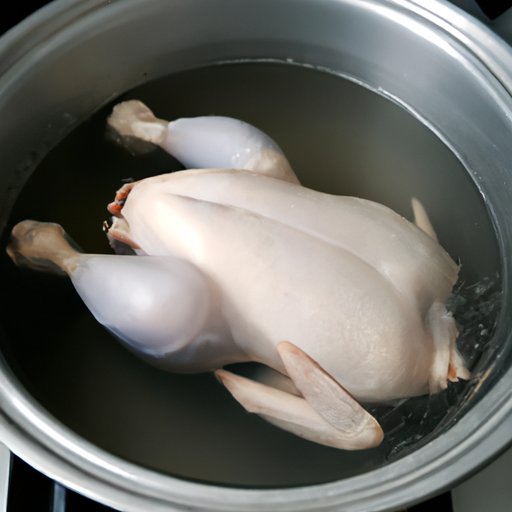
Introduction
Boiling chicken is a cooking method that involves immersing the chicken in boiling water until it’s completely cooked. This approach is easy, quick, and produces a healthy meal that’s low in calories and full of nutrients. However, many people wonder how long they should boil a chicken for moist, flavorful results. In this article, we’ll explore various factors that determine boiling time and discuss how to cook the perfect boiled chicken every time.
The Science behind Boiling Chicken: How to Cook the Perfect Chicken in 20 Minutes or Less
The process of boiling chicken involves submerging the chicken in a pot of boiling water and letting it cook through. Boiling chicken is an effective way to cook chicken since the heat from the water is distributed evenly throughout the chicken. This process ensures that all parts of the chicken are well-cooked, thus minimizing the risk of undercooked meat.
Several factors can affect boiling time, such as chicken size, cut, and starting temperature. Generally, the larger the chicken or the meatier the cut, the longer the cook time required. However, it’s important not to overcook chicken, as it can lead to dry, tough meat that lacks flavor.
If you’re short on time, there are a few things you can do to speed up the cooking process. Slicing or dicing the chicken into smaller pieces can reduce cooking time by up to 50%. Additionally, boiling water with salt or other seasonings can create an aromatic broth that infuses the chicken with additional flavor.
The cooking time can vary based on which part of the chicken you’re boiling. For example, chicken breasts cook faster than thighs and legs. Below are some recommended cooking times based on the cut of chicken.
The Ultimate Guide: The Exact Time Needed to Boil a Chicken for Maximum Flavor and Juiciness
Several factors determine the flavor and juiciness of your boiled chicken. The cooking time is a critical factor that determines the final texture and flavor of the chicken. When it comes to boiling a whole chicken, the ideal cook time is around 1 hour and 15 minutes, a chicken breast is around 15-20 minutes, and a chicken thigh is around 25-30 minutes.
It’s important to note that overcooking chicken can lead to dry, tough meat. Therefore, you want to make sure to monitor the temperature of the cooked chicken to ensure that it doesn’t overcook. To maximize flavor and juiciness, it’s essential to season the water with spices and vegetables like onions, garlic, and celery.
Simple and Delicious: A Beginner’s Guide to Boiling a Chicken
Boiling a chicken is a straightforward process that requires little prep work. To get started, you’ll need a large pot, enough water to cover the chicken, and the chicken itself.
First, add the chicken to the pot and add enough water to cover it. Bring the water to a boil over high heat. Once it starts boiling, lower the heat to medium-low and let the chicken simmer gently. Add your preferred seasonings, such as salt, pepper, garlic, onion, and herbs. The chicken is ready once the internal temperature reaches 165°F.
If you want to add more flavor to your boiled chicken, you can add different ingredients to the pot, such as lemon, ginger, soy sauce, or bay leaves. Additionally, boiled chicken pairs well with different sides like steamed vegetables, rice, or beans.
A Healthier Choice: The Benefits of Boiling Chicken and How to Do It Right
Boiled chicken is a healthier alternative to other cooking methods like frying or sautéing since it doesn’t require any added fat. Additionally, boiling helps to remove excess fat and cholesterol from the chicken, making it a leaner protein source. The nutrients and minerals found in boiled chicken help to foster healthy muscles, bones, and cellular structure.
Maximizing the nutritional value of boiled chicken depends on how you prepare it. When cooking chicken, it’s essential to be mindful of the heat and cooking time. Overcooking the chicken can lead to the loss of vitamins and minerals present in the meat. Therefore, boiling chicken is an efficient way to retain the nutrients and minerals present in chicken.
To select healthier chicken, it’s necessary to look for chicken that is free from antibiotics or added hormones. Organic or grass-fed chicken is the best option since it contains fewer toxins or pollutants.
More Than Just Boiling Water: Tips and Tricks for Perfectly Boiled Chicken Every Time
One way to make your boiling chicken experience better is by creating a flavorful broth. To create the perfect broth, use aromatics like onions, garlic, or ginger, and add salt, pepper, or spices for an added kick. Adding vegetables like carrots, parsnips, or celery can amp up the flavor and nourishment of the broth.
To ensure the chicken stays tender and moist, it’s critical to avoid overcooking it. The ideal cooking time varies based on the cut and size of the chicken. A thermometer can help you monitor the internal temperature of the meat to ensure it’s cooked through.
Boiled chicken can be used in various recipes, such as soups, stews, salads, and sandwiches. Adding boiled chicken to a dish can intensify the flavors and textures of a meal, making it more satisfying and filling. You can also use boiled chicken as a protein source in gluten-free and low-carb diets.
Conclusion
Boiling chicken is an easy, affordable, and healthy way to enjoy chicken. Knowing how to boil chicken properly can help you cook a nutritious and delicious meal in minutes. Whether you’re a beginner or an expert cook, there’s always something to learn about boiling chicken. Follow these steps to maximize the flavor and juiciness of your boiled chicken, and experiment with different techniques and recipes to elevate your culinary game.




